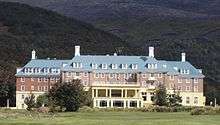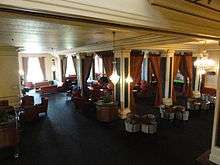Chateau Tongariro
Chateau Tongariro is a New Zealand hotel and resort complex.


It is located close to Whakapapa skifield on the slopes of Mount Ruapehu, and is close to the volcanic peaks of Mount Tongariro and Mount Ngauruhoe, within the boundaries of Tongariro National Park, New Zealand's oldest.
Chateau Tongariro Hotel the building was completed in 1929 and, despite extensive refurbishment, still retains much of the style of the pre-Depression era.
History
In 1887 the Paramount Chief of Ngati Tuwharetoa, Horonuku Te Heu Heu Tukino gifted the tribes land – including the sacred mountain peaks of Ruapehu, Ngauruhoe and Tongariro - to the people of New Zealand. The gifting was to ensure the area’s protection for all time, for all people.
In 1925 Sir James Gunson drove the first car to Whakapapa. The new ‘highway’ was pushed through towards Mt Ruapehu with the help of labour from the Whakapapa prison camp early in 1925 under the supervision of Dave Dunlop. Until then the approach to Whakapapa had been only for the fit and strong. There were miles upon miles of wild country to cross on foot or horseback, wild rivers to ford and mountainous terrain to navigate.
Construction
In 1923, the Tongariro National Park Board investigated a site for a 100-bed hostel in order to encourage tourists to visit the newly formed Park, but it wasn't until 1925 that New Zealand Government via the National Park Board followed up this initiative by offering to lease land and lend up to £40,000 to any private company which would build and operate a hotel on the site.[1]
Rodolph Lysaght Wigley (1881-1946) the managing director of the Mount Cook Tourist Company took up the option. He formed the Tongariro Park Tourist Company with a vision to build the Chateau, alongside the original Whakapapa Ski huts. To raise capital for the undertaking the company was floated on the sharemarket, where it was poorly subscribed. The company signed a lease with the government on 9 November 1928, a condition of which was that the building had to be erected by 31 March 1930 (barely 17 months away) and that it "cost not less than £40,000 or more than £60,000".[2] Despite only £30,000 of shares being taken up, Wigley let a contact in late 1928 to Fletcher Construction Company, which also involved Fletchers buying 15,000 of shares in the Tongariro Park Tourist Company.[3]
The Chateau was designed by Timaru-based architect Herbert Hall (1880-1939), who modelled his design on the Canadian Resort of Lake Louise designed a neo-Georgian structure of four stories and basement.
The foundation stone was laid on 10 January 1929. Fletchers used a workforce of over 80, offering an incentive of free accommodation and a free suit to workers who stayed until the completion of the project. Most of the labourers were recruited from the Waikune Prison, which was the closest neighbour to the construction site.
The building was open for guests by 1 August 1929, even though it was still unfurnished. It was officially opened on 13 November 1929 with Fletcher Construction still owed £28,000.[4]
The total cost was £88,000 (well over the contract price) of which the hotel had cost £78,000 while at the request of the Tourist Company another £10,000 had been spent building extra wooden buildings, a garage and a golf course in the front of the hotel. The golf course was designed by an architect serving a prison sentence and built by prison labour.[5] Wigley had led Fletchers to believe that if they overspent the company would be reimbursed by the Mount Cook Tourist Company. Unfortunately due to the Depression it was in difficulties and so would not pay for the increased expenditure. James Fletcher, the head of the company approached the Prime Minister Sir Joseph Ward and asked him to increase the government loan to £60,000. Ward agreed and Fletcher obtained a promise from Wigley that the bulk of this injection of money would go to pay Fletchers. As the Tongariro Park Tourist Company was by now in serious financial trouble, which was not helped by spending lavishly on fitting out the hotel. Wigley reneged on the deal and passed on only £10,000. The onset of the depression delayed hopes of a tourism boom. To secure their debt Fletchers put the Tongariro Park Tourist Company into receivership in February 1931, took control of the hotel and ran it for 3 months before walking away with a loss of £19,000, (which included £1000 of losses incurred during their period of ownership).[6]
Government Ownership
The hotel was eventually taken over by the National Park Board.[7]
The Chateau was commandeered by the New Zealand government as an asylum when an earthquake damaged a hospital in Wellington and then served as a rest and recuperation centre for Air Force personnel returning from service in World War II.[8]
In 1948, newly renovated, the Chateau reopened to provide accommodation for visitors to Mt Ruapehu and the Tongariro National Park.
In 1957, control of the Hotel passed to the Tourist Hotel Corporation (THC) of New Zealand, which also developed the Whakapapa skifield.
Private Ownership
In 1990, during a period of Government privatisation of assets, the Chateau was sold to Kah New Zealand Limited, a subsidiary of Oriental Holdings Berhad (OHB), a Malaysian-based conglomerate. The new owner invested NZ$3 million in refurbishing the complex. The ski area was sold to a separate company. In 2005 a new five-storey wing costing NZ$6 million and containing 40 rooms and replicating the style of the original building was opened. To avoid disturbing guests the expansion used a Scandinavian system of modular construction with the rooms built in Auckland and trucked to the site where they were installed using a crane. A presidential suite occupies the top floor. The Chateau Tongariro is currently operated by Bayview International Hotels and Resorts, which is also a subsidiary of Oriental Holdings Berhad (OHB).[9]
Power supply
Power to the complex was initially provided by a coal fired furnace which heated water which was then circulated around the complex to provide heating and 100 kW hydro power station in the Whakapapanui Stream which provided power for lighting and cooking.[10]
By the early 1950s the existing power supplies at the complex were becoming inadequate. In June 1952 the Ministry of Works requested the King Country Electric Power Board to provide a 500 to 600 kW power supply to the Chateau. This resulted in an 8.5 mile long overhead 11 kV transmission line being constructed and commissioned in 1955. This not only supplied power to the chateau but also to the Whakapapa ski field and to several mountain huts on Mount Ruapehu.[11]
In the early 1960s a second line was constructed and commissioned in 1964 by the King Country Electric Power Board to improve the reliability of supply to the Chateau and to other customers in the area.[12]
References
- ↑ Goldsmith. Page 56.
- ↑ Smith. Page 144.
- ↑ Goldsmith. Page 56.
- ↑ Goldsmith. Page 57.
- ↑ Smith. Page 145.
- ↑ Smith. Page 145.
- ↑ http://www.teara.govt.nz/en/hotels-and-motels/5?setlang=mi. Retrieved 14 February 2011.
- ↑ http://www.tourismnewzealand.com/media/127126/tourism%20centenary.pdf. Retrieved 14 February 2011.
- ↑ http://www.bayviewhotels.com/index.cfm?id=33C942D4-7E9F-33E6-3B7191CB05702F1A. Retrieved 14 February 2011.
- ↑ Reilly. Pages 46, 85.
- ↑ Reilly. Pages 85 and 86.
- ↑ Reilly. Pages 104 to 106.
Further reading
- Goldsmith, Paul (2009). Fletchers – A Centennial History of Fletcher Building (hardback). Auckland: Davia Ling Publishing. p. 352. ISBN 978-1-877378-35-5.
- Reilly, Helen. Switching on the King Country (hardback). Wellington: Steele Roberts. p. 243. ISBN 978-1-877448-99-7.
- Smith, Jack (2009). No Job Too Big – A History of Fletcher Construction Volume I: 1909-1940 (hardback). Wellington: Steele Roberts. p. 342. ISBN 978-1-877448-69-0.
External links
Coordinates: 39°12′00″S 175°32′21″E / 39.2000°S 175.5392°E